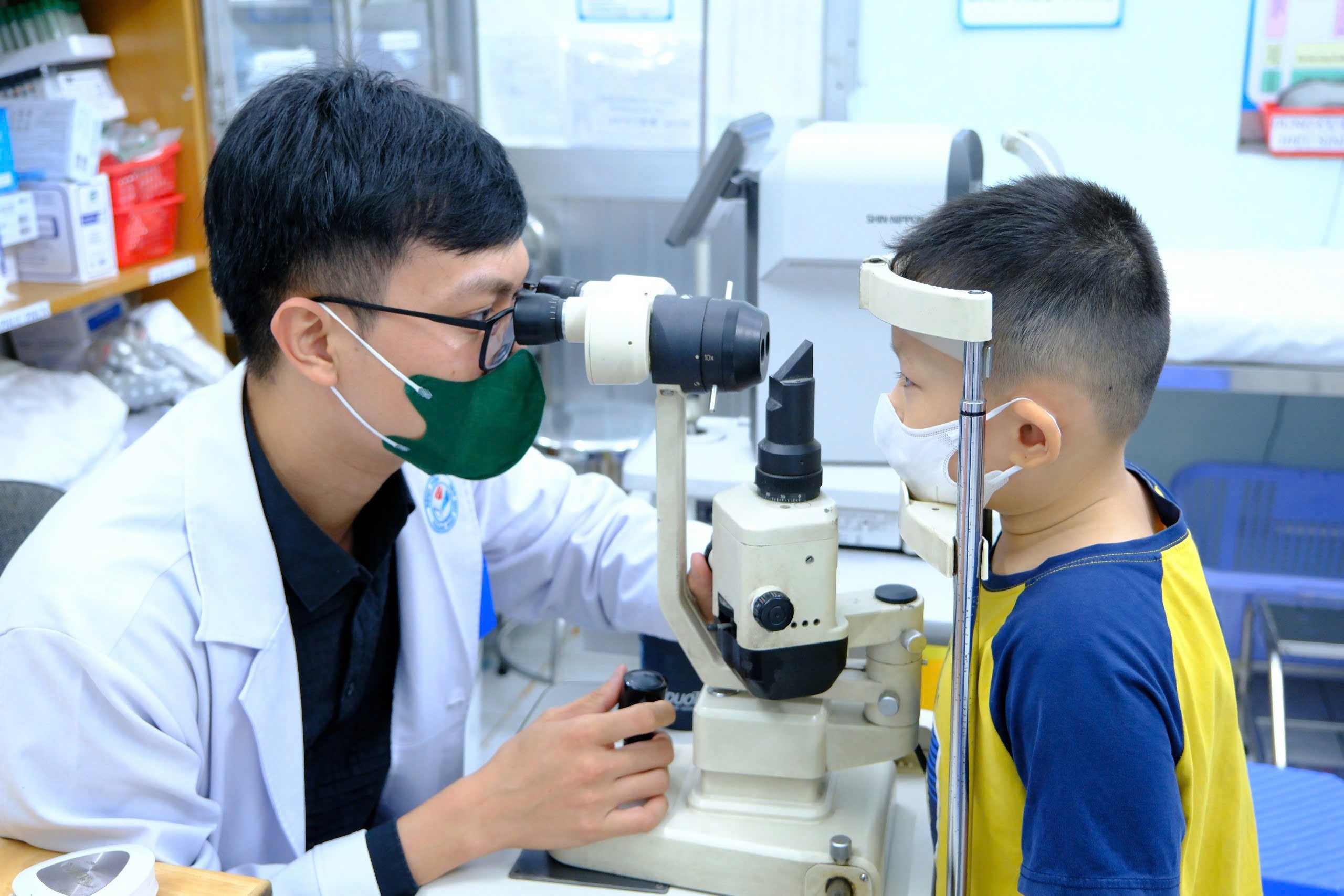Pink eye disease increases after Tet
On the same day, the leader of Ho Chi Minh City Eye Hospital also informed that from the beginning of January 2025 until now, the hospital has received 11,206 cases of pink eye, with some weeks receiving 1,700 - 2,000 cases. This number is equivalent to the same period in 2024 (11,264 cases).

Examination for pink eye at Thu Duc City Hospital
"In the period from late December to mid-February, the situation of pink eye has complicated developments, with an increasing trend in the number of cases in January, especially high in the middle weeks of the month. This is the time near the Lunar New Year 2025, many activities of communication, shopping, and traveling can be factors that increase the risk of spreading the disease. The sharp increase in cases in January is a remarkable sign, showing the risk of local outbreaks in some areas," Dr. Pham Nguyen Huan, Deputy Director of Ho Chi Minh City Eye Hospital, reported and commented.
According to Dr. Huan, in 2024, the epidemic peaked in January and decreased rapidly after Tet. In 2025, the number of cases in January decreased slightly but increased sharply in February, especially after Tet. "This is a warning sign of the risk of an outbreak later than in 2024," the leader of Ho Chi Minh City Eye Hospital warned.
Last week, the number of cases of pink eye showed signs of decreasing, but this may only be a temporary lull, the risk of pink eye outbreaks is likely to flare up and last longer if there are no good control measures. This is also the time when people return to work, students return to school after Tet holiday, the frequency of contact is higher, the risk of spreading in the community is very high...
Causes of disease
According to Dr. Nguyen Quang Huy, Thu Duc City Hospital, pink eye can be caused by many different factors. The most common are viruses, bacteria and allergic reactions.
In viral conjunctivitis, the disease process occurs when the virus invades and destroys cells, accompanied by an inflammatory response from the immune system. Bacterial conjunctivitis usually occurs when bacteria enter through small scratches or when the eye's protective system is weakened, and is characterized by a thick green or yellow discharge.
Notably, at the time of winter-spring transition, the number of cases of allergic conjunctivitis often increases dramatically. The reason is that the air contains a lot of pollen, combined with cold weather and little wind, causing fine dust and allergens to settle more. This increases the risk of allergic conjunctivitis in people with sensitive skin.
Complications from overuse of corticosteroid eye drops
Regarding treatment time, according to Dr. Nguyen Quang Huy, each type of pink eye has a different progression. Viral pink eye usually resolves on its own after 7-10 days, while allergic pink eye can last from a few days to a few months, depending on the individual and exposure to the allergen. As for bacterial pink eye, the treatment time depends on the response to antibiotics.
Doctor Huy warned: The hospital has recorded many cases of secondary glaucoma complications due to the abuse of eye drops containing corticosteroids because of their pleasant properties and the rapid reduction of unpleasant symptoms that corticosteroids bring. If this condition persists, eye pressure will increase silently and can lead to glaucoma, with the risk of permanent vision loss.
Disease prevention
For effective prevention, Dr. Quang Huy recommends that people wear protective glasses when going out, avoid contact with allergens, and keep their living space clean, especially teddy bears, blankets, bedding, etc., and pay attention to eye hygiene. In particular, when experiencing symptoms such as red eyes, eye pain, watery eyes, or irritation, patients should immediately go to a medical facility for examination and appropriate treatment. This is to avoid unfortunate complications that may occur due to self-treatment or self-diagnosis because many serious eye diseases have similar symptoms.
According to Dr. Huy, children, because their immune systems are not yet fully developed, can get sick more often than adults. Therefore, exposure and creating antibodies to train the immune system is one of the necessary steps for the development of an increasingly complete immune system. Parents need to pay special attention and closely monitor when children show unusual signs in the eyes.
According to Dr. Pham Nguyen Huan, agencies and schools need to proactively monitor collective health, quickly detect suspected cases to take timely isolation and treatment measures. Maintaining vigilance and promoting propaganda in the community are important solutions to limit the risk of the epidemic re-emerging.
Source: https://thanhnien.vn/nguy-co-bung-phat-dich-benh-dau-mat-do-tai-tphcm-185250219165401127.htm

































Comment (0)